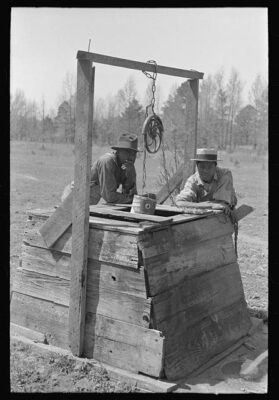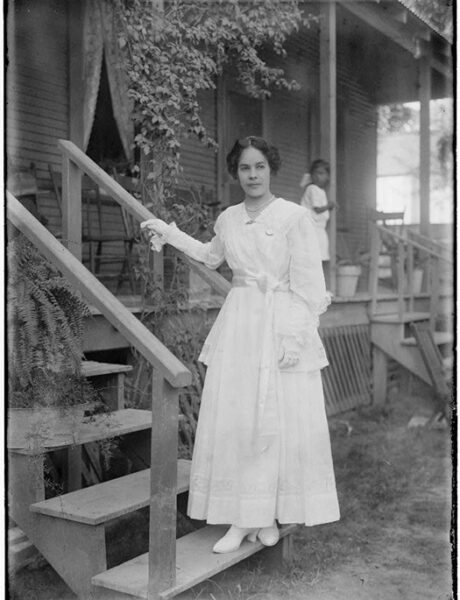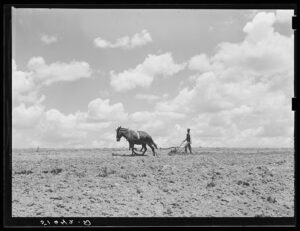Lumberyard Sestina
Dennis, they called him Dink, spoke like only a man with a plug of Days Work and twelve teeth
could speak. The rise and fall of his voice a mere roadmap to the meaning. How else can
words be learned? He was no mentor, but I was the new man push-brooming muddy brown
puddles out the door of the shop and watching the fog burn off. My time card
gleamed unstained in its metal slot beside the clock set to watch
the intervals of our days. Across the valley, stomped the diesel chug of a train.
The day begins and ends with the hungry saw. I have no time to train.
The round spin-howl blades both left and right are its teeth.
They bite the ends off boards that roll in on its metal tongue. We cannot watch
it eat and digest. Our job, re-pack the boards as they are shat off the conveyer. We can
be the anus of the machine. We clamp and shove in turns, each dump recorded on a card.
We break when the machine does, pour bad coffee from a thermos — thin, bitter, and brown.
Bill, who feeds the saw two boards at a time, has rubbed at the pain in his back until a brown
stain lives on each of his blue shirts. He keeps a rhythm with the saw dogs until we empty the train
car loads of lumber. Lunch is potted meat, boiled greens, and a game of Five card
stud, deuces wild, quarter ante, fifty-cent limit. We throw empty curses and threats with no teeth
across the rough table. Eyes out the window toward the office, before the boss can
get out the door the deck disappears; coins find an overall pocket, company for a big watch.
This yard is a dangerous place. Dink has lost a thumb. Shop walls are gouged by forklift tines. Watch
out for Jeff. He don’t use the brakes. He’ll just run it into something cheap. He like to killed Junior Brown
back a couple years ago. Ol’ Junior was up in a truck straightening crossties with a cant
hook. Jeff done dropped a load on top of him. Like to broke his neck. In the afternoon the train
cars need unloading. The skinny sticks that serve as bones for house trailers await the teeth
of the same mouth that chewed fat crossties only minutes before. It’s all just hours on a time card.
Sweaty days pass. The bald mountain out the shop window glows like someone else’s post-card.
In the evening, it’s home to microwave dinner, beer, bong hits, and three snowy channels to watch,
or range around spider-web woods while my city-dog tries in vain to get squirrels in his teeth.
This college-break job is actual work, country song work, not a life guard whistle and watching brown
girls roll over on their towels. In the night, through screened windows, the racket of the train
shuttles more lumber into the mill for tomorrow. Curse the heat and try to sleep as best I can.
When the leaves droop in weary colors and the garden plants sag under the weight of seasons, I can
stuff my clothes, music, and the rest of my life into a few boxes and head off to chase a report card.
The sweet green smell of pine sawdust will wash from my skin, but the sound of the train
will make my hands twitch for want of a smooth stick of lumber. Stepping off a curb I’ll watch
for yellow forklifts roaring around the corner, but only for a while. These habits brown
and rot like bananas or tobacco-stained teeth.
Work bites with teeth that eat days, but all you can
do is keep the brown rust of routine polished away. Soon enough the card
of your passing will hide like a broken watch in a coat pocket, and the train will carry coffin wood.
**
News from home
want to leave work
stalk out into the woods
sit under a tree with bugs
crawling over my legs and wait
for a fox to come trotting
like the one my grandfather
wouldn’t let me shoot
want to forget my grandfather’s face
thin and tight as a rifle barrel
emptied inside
on the bed away from home
skin stretched over his bones
like a pelt shot full of holes
by a dumb kid
**
On Mapping a Slave Cemetery
Chasing a real estate deal, we tromped through the woods,
batting in vain at left-over spider webs that stuck to our faces
and glued specks of digested bugs into our hair.
We carried a bundle of small pink flags and a hundred-foot tape measure.
Last November’s leaves crashed under our feet so loud we could hear no other sound.
We follow a small creek that seemed to laugh at our work.
Someone must have known these graves were here, such digging takes much work.
They would be easy to overlook, so modest in these resurrected woods
vague depressions littered with years, forgotten by sight, deprived of even the rattling sound
of leaves and cracking limbs that rot and dissolve into the ground, Neglected bones, forgotten faces.
Like a suture scar, the stones, one at the head, one at the foot. Five paces measure
each stitch in this ragged streak . A poison vine snakes through, covered in woody hair.
We are three, me, my father, and his business partner. Three divorces between us have thinned our hair.
Whiskey-stained brains, anger-smudged faces, all that brightens this day is the bleach of work.
Plans, and deals that fill the gaps as jagged stones fill a glass jar. Measure
them wrong and the shattering will foul the room with rough and bleeding words. In these quiet woods
we can put that risk away and search for graves unnamed and remark how each one faces
the same direction, east, toward the morning sun, waiting for resurrection’s trumpet to sound.
Three graves make the first row, six little pink flags, fifteen feet, ten inches, call it sixteen. The sound
of a train rattles the air. No one lying in this ground ever heard a locomotive before his hair
was eaten by worms and time. “Him?”, maybe there are women in this ground too. Their faces,
what did they look like? We cannot know. The fields and barns too are gone where they did their work.
Twenty-nine feet, let’s make it thirty. We want to give them space to rest in these woods.
One grave, off by itself, separated for some reason in space; bonded by time. We must re-measure.
The graveyard grows, taking in a hemlock with soft needles. Its height and girth measure
time better than any calendar, or watch, or even the bones of man. Strange as it may sound
it feels like we have found some treasure in these Virginia woods;
a record of lives and deaths, of how even the churchyard eternity was denied by the kink of hair
and the tint of skin. Their graves we will forever mark on maps, maybe some good comes of this work,
beyond money, beyond the satisfaction of the deal. We cannot give back their names or faces,
but now our maps know where they rest. To die and have even his grave forgotten, a fate every man faces
perhaps this mapping restores something stolen. Perhaps it eases the lingering guilt by a small measure,
or hands a fraction of satisfaction to our own lives, something greater than this survey work.
Maybe, though, we are just hiding here in the spring, in this cool hollow, off a twisty road with the sound
of birds. Our task is clear, draw a shape on a map. No lawyers, paperwork, or angry women in our hair.
This is why men go into the woods.
We would sell these woods, and the graves in them. Could we tell them to their faces
that even in death they are property? It will grey our hair, the answer. We may measure
ourselves against the past, but the sound of shovels digging will work its way to our ears.
**
Trailways Madonna
She had no choice but the seat next to me.
Told me her real name eventually,
Said a pistol hurt her hand.
In her good hand, a sheet of paper.
worn and smudged, a photograph
printed on a dull computer,
a boy, maybe 8 or 9 holding
a soccer ball on his hip smiling
as a dog’s tail disappears out of frame.
“He’s with his abuela in Fairfax.”
She folded the picture along familiar creases,
clumsy from the bandages on her fingers .
Underneath, the doors slammed,
locking in the baggage and leaving
the diesel heartbeat of the bus the only sound.
She made the sign of the cross;
settled back into her seat;
closed her eyes for the trip home.







